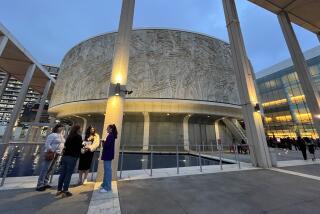Review: With ‘California: The Tempest,’ Cornerstone makes homespun magic
After a year on the road, taking its production of “California: The Tempest” from Eureka to Pacoima, Cornerstone Theater Company returned last weekend to downtown Los Angeles, where the tour began, to present the final performances in Grand Park.
This project was the culmination of 10 years of creative community outreach, and only a curmudgeon could disapprove of Cornerstone’s mission here: taking Shakespeare to mostly small towns, working with the residents to shape a production that unites far-flung and diverse communities, while celebrating the charms and challenges of each. Amateur actors performed alongside Cornerstone members.
In downtown L.A., where the last of three shows ran Saturday, residents took the stage to talk, lyrically and honestly, about their hometown, its new condos and its “urine stench.”
The performances were free and held outdoors in the balmy June twilight of the breathtaking amphitheater of Grand Park. The sound was clear; the staging was inventive and charming. The audience picnicked, children frolicked.
Although commendable, heartwarming and convivial, community theater projects don’t always result in the most scintillating entertainment. No matter how supportive you want to be, you can’t help noticing that the powers of stagecraft are being employed to teach you something. You may feel sulky about this bait-and-switch even when it’s done well. Your ticket is free, but depending on your disposition, you may find sitting through frequent lectures costly.
For “California: The Tempest,” playwright Alison Carey relocates Shakespeare’s plot to modern-day California and shoehorns in a lot of information about our state that is tenuously related to the story. The result is clever, ambitious and ungainly, with discordant elements stitched together and too many points to make. Enchanting scenes fall between long, arid stretches. A bit like California itself, come to think of it.
Here is the gist: Prosper (the lovely Bahni Turpin), once the governor of California, is replaced by her scheming sister, Antonia (Maria Cano). Left for dead, Prosper and her daughter, Minerva (Karen Covarrubias), are rescued and delivered to a remote mountaintop. There Prosper learns magic and enslaves two supernatural beings: Ariel, a blue-haired sprite (the magical Page Leong), and Caliban, an affection-starved malcontent (the hammy Peter Howard).
Now the villainous Antonia and her posse are on a plane, which Prosper causes to crash on the mountain. For good measure, she throws in an earthquake, making California sink and turning her mountaintop into an island.
The updates create some interesting new resonances — Caliban’s name gets a new meaning, “banned from California” — but much of the time they feel poorly integrated and preachy.
After the plane crash, instead of focusing on their survival, the passengers take turns discussing the agriculture of the regions they represent. The amateur performers are all charming and robustly directed by Michael John Garcés, but their many missed lines, long pauses, alarmed mutual glances and self-recriminating gestures made me think of the rude mechanicals’ production of “Pyramus and Thisbe” in “A Midsummer Night’s Dream,” a play that might have been a better choice for this project.
But as the evening ultimately proved, even a rough magic can enchant. The passion for art and for community that infused this production exerted a unifying force on the crowd. I joined the freeway traffic more philosophically than usual and felt like a real Californian.
More to Read
The biggest entertainment stories
Get our big stories about Hollywood, film, television, music, arts, culture and more right in your inbox as soon as they publish.
You may occasionally receive promotional content from the Los Angeles Times.






